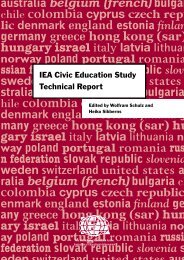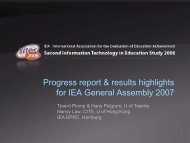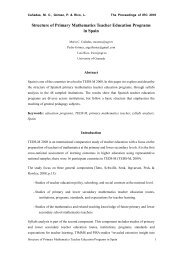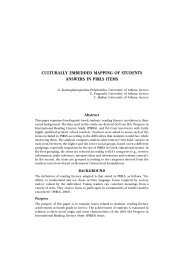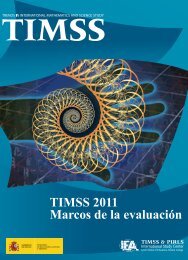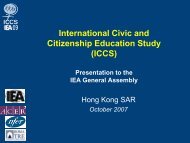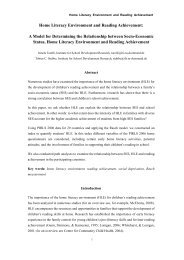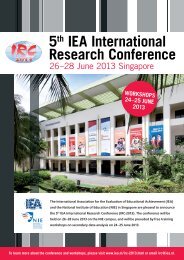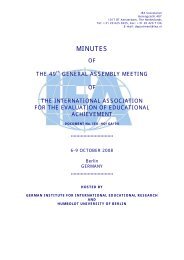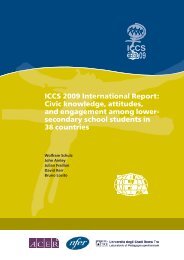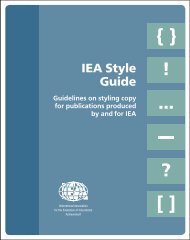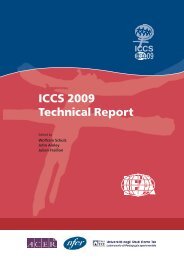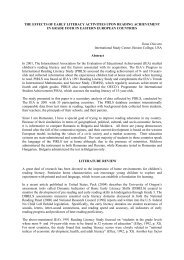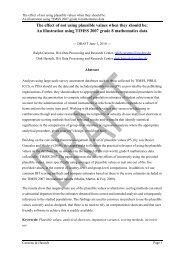International civic and citizenship education study - iccs - IEA
International civic and citizenship education study - iccs - IEA
International civic and citizenship education study - iccs - IEA
- TAGS
- civic
- citizenship
- iccs
- www.iea.nl
Create successful ePaper yourself
Turn your PDF publications into a flip-book with our unique Google optimized e-Paper software.
An important feature of ICCS is the establishment of regional modules. Regional modules<br />
compromise groups of countries from the same geographic region that together administer<br />
additional instruments to assess region-specific aspects of <strong>civic</strong> <strong>and</strong> <strong>citizenship</strong> <strong>education</strong>. Three<br />
regional modules have been implemented as part of ICCS for participating countries in the<br />
regions of Europe, Latin America, <strong>and</strong> Asia respectively.<br />
The following instruments are administered as part of the ICCS survey:<br />
• An international cognitive student test consisting of items measuring students’ <strong>civic</strong> knowledge<br />
<strong>and</strong> ability to analyze <strong>and</strong> reason.<br />
• A student questionnaire consisting of items measuring student background variables <strong>and</strong><br />
student perceptions <strong>and</strong> behaviors.<br />
• A regional student instrument, administered after the international student assessment <strong>and</strong><br />
possibly consisting of region-specific cognitive <strong>and</strong> questionnaire-type items. This<br />
instrument will only be used in countries participating in a regional module.<br />
• A teacher questionnaire, administered to selected teachers teaching any subject in the target<br />
grade. It gathers information about teacher background variables <strong>and</strong> teachers’ perceptions of<br />
factors related to the context of <strong>civic</strong> <strong>and</strong> <strong>citizenship</strong> <strong>education</strong> in their respective schools.<br />
• A school questionnaire, administered to school principals of selected schools to capture<br />
school characteristics <strong>and</strong> school-level variables related to <strong>civic</strong> <strong>and</strong> <strong>citizenship</strong><br />
participation.<br />
• An online national contexts survey, completed by national center experts with regard to the<br />
structure of the <strong>education</strong> systems, the status of <strong>civic</strong> <strong>and</strong> <strong>citizenship</strong> <strong>education</strong> in the<br />
national curriculum, <strong>and</strong> recent developments. The data obtained from this survey assist<br />
with the interpretation of the results from the student, school, <strong>and</strong> teacher questionnaires,<br />
<strong>and</strong> provide a description of the context for <strong>civic</strong> <strong>and</strong> <strong>citizenship</strong> <strong>education</strong> in each<br />
country.<br />
The assessment framework provides a conceptual underpinning for the international<br />
instrumentation for ICCS <strong>and</strong> has also been a point of reference for the development of<br />
regional instruments.<br />
Characteristics <strong>and</strong> structure of the ICCS assessment framework<br />
Given the central role of the assessment framework in the process of instrument development, it<br />
has been important to:<br />
• Maintain a strong connection to the constructs used in the <strong>IEA</strong> CIVED survey of 1999;<br />
• Reflect contemporary research underst<strong>and</strong>ings of manifestations of <strong>civic</strong> <strong>and</strong> <strong>citizenship</strong><br />
<strong>education</strong> in school students;<br />
• Meet the needs of participating countries;<br />
• Address the research questions outlined in the ICCS proposal for the <strong>IEA</strong> General<br />
Assembly of 2005;<br />
• Include only content that can be measured;<br />
• Compile content descriptors that are agreed to be significant <strong>and</strong> discrete <strong>and</strong> that describe<br />
the breadth of <strong>civic</strong> <strong>and</strong> <strong>citizenship</strong> <strong>education</strong> for school students; <strong>and</strong><br />
• Address the contexts within which <strong>civic</strong> <strong>and</strong> <strong>citizenship</strong> <strong>education</strong> takes place.<br />
The assessment framework consists of two parts:<br />
• The <strong>civic</strong> <strong>and</strong> <strong>citizenship</strong> framework outlines the aspects to be addressed when collecting the<br />
outcome measures through the cognitive test <strong>and</strong> the student perceptions questionnaire.<br />
• The contextual framework provides a mapping of context factors that might influence<br />
outcome variables <strong>and</strong> explain their variation.<br />
ICCS ASSeSSment FrAmework<br />
11



